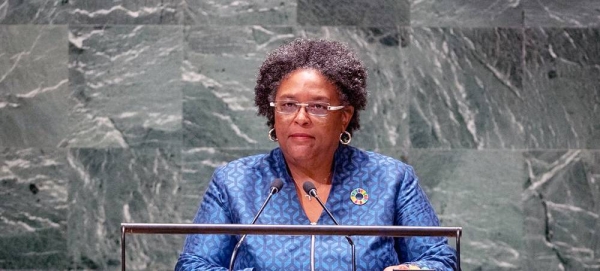
The Lebanese filmmaker has made Hollywood movies and niche documentaries, and is a US resident who continues to celebrate his homeland
DUBAI: For every artist to succeed, someone has to believe in them. For Lebanese writer-director Omar Naim, whose latest movie, “Becoming,” just ended its run in GCC cinemas, it was screen legend Robin Williams.
For the latest updates, follow us on Instagram @arabnews.lifestyle
Naim, now 43, was 25 at the time, and he’d written a script entitled “The Final Cut,” a prescient sci-fi drama about a world in which a person’s every memory is recorded and sold to the living after they die. He’d never directed before, but ever since he’d seen “Goodfellas” at the age of 14 it had been all he wanted in the world. He was finally ready, and he came to a meeting with Lionsgate executives with storyboards and essays to prove it.
The executives were impressed, but they had one final test for him before allowing him to step behind the camera. They pushed across the table a list of some of the top lead actors in Holly “They said, ‘Look, if you can convince one of these actors to do the movie, within a year, then you can direct it,” Naim tells Arab News.
Naim nervously sent the script to Williams. To his surprise, Williams immediately liked it and came to meet with the wild-haired Beirut native. The pair took to each other immediately. “It turned out he was a big science-fiction fan and had a dark streak,” says Naim. “We met and he just liked me. We liked each other. He trusted me. Two months later, we were shooting. It was really down to him and his willingness to trust me. Once he was on board, everything came together. Everyone wants to work with him and his trust in me created a great tone on set.”
Despite Williams’ faith in him, Naim was so intimidated that he couldn’t even bring himself to call him “Robin” on set, instead always addressing him as “Robin Williams,” and was hesitant about giving instructions to the legendary actor, who died in 2014 at the age of 63.
“I was a little worried. Like, what am I going to tell Robin Williams? What could I possibly add to this? But he really liked my ideas, and I kept giving him things to do. ‘And you don’t have to keep calling me by my full name!’ Robin Williams told me,” says Naim. “I have been reading interviews with directors my whole life, trying to find out exactly what you tell the actors. And they all say, ‘It"s hard to talk about.’ I"m, like, ‘Just give me this specific thing to say.’ And it turns out, it"s not like that. It"s like a friendship.”
“Becoming” brings Naim back to the role of writer-director, this time for a horror film starring Toby Kebbell, the actor who coincidentally starred in an episode of the sci-fi antholgy “Black Mirror” called “The Entire History of You,” which was clearly influenced by “The Final Cut.” In “Becoming,” Naim explores the horror of losing your own identity, focusing on a man and his wife after the man is possessed by a demonic entity that slowly starts to take over his entire pers “I"ve been married for a long time,” Naim says. “You get to know another human being very intimately in all their details: How they hold their fork, what the first thing they do when they wake up is... What if those details start to change? How unnerving would it be if their voice started to change, or their handwriting?”
Like many of the best horror films of the last decade, the terror of “Becoming” is rooted inside its characters’ minds, allowing Naim to focus in on the performances of Keppell and Penelope Mitchell.
“It is very much an intimate character film, I wanted to do something very much actor-driven. It"s basically just two people and the camera for most of the movie,” Naim says. “I found I discovered during it that I really love directing very intimate, emotional character scenes.”
Naim has always been careful not to lose his own identity. Like a lot of Lebanese families, Naim’s left during the Civil War. Naim was born in Jordan and grew up in Cyprus before returning as a teenager to attend high school and university in Beirut.o Although he left Lebanon to study at Emerson College in Boston and has now lived with his wife in the United States on the West Coast for many years, he’s kept strong bonds with his homeland. He returns to Lebanon every year and has focused on the country in multiple documentaries, starting with “Grand Theater” in 1999 and continuing with the upcoming “Two Cities,” which he’s currently in the process of finishing.
Robin Williams was not the first legendary actor to believe in Naim, of course — the first was his mother, Nidal Al-Achkar, 86, the ‘Grand Dame of Lebanese theater,’ who founded the Medina Theater upon their return to Lebanon in 1994.
From that point onwards, Naim became fascinated with the theatrical history of Lebanon, to which his mother had contributed so greatly. Naim’s first documentary, “Grand Theater,” told the story of the iconic, bullet-ridden titular building which still stands in Beirut today. It was a meditation on how the arts were caught in the crossfire of a divided city. The experience allowed Naim to dig out the roots he hadn’t seen from the surface.
“My mother put me in touch with the theatre community. I got to travel all over the country in our car with the crew, talking to all kinds of different people of all age ranges. I had to prepare the research to do those interviews well, and then become like a detective. It was the best way for me to discover my country, and (‘Two Cities’) was also a big discovery for me. There’s something about the detective lens of making a documentary that allows me to push and ask questions, or go places, I wouldn"t usually,” says Naim.nality.wood. “Grand Theater” also captured a post-war Lebanon trying to get past the conflict, perhaps too quickly.
“The country was moving forward — not looking back and not dealing with the problems, just sort of stitching up the wounds. It turns out, you know, we should have probably addressed those problems, because we"re still dealing with them now,” says Naim.
The upcoming “Two Cities,” which Naim intends to be the second in a trilogy about theater in Lebanon, was born initially from a request his mother to document the 20th anniversary of the Medina Theater.
“It was a simple assignment to just document something. I just saw an opportunity to do something bigger,” says Naim. “It’s sort of my biggest, most personal statement about Lebanon yet. Not only is it about the city, but it"s about my parents. And it’s sort of about me, having left and come back.”
Naim, like all Lebanese people both inside the country and abroad, has been devastated by the horrific explosion in Beirut port on August 4, and says it has deepened his resolve to tell stories that his country needs to be told. He is hoping to do a fictional film set there as well. “I have to earn my way back in if I want to, which I'm which I'm fine doing,” Naim says. “I"m happy to do that.”












